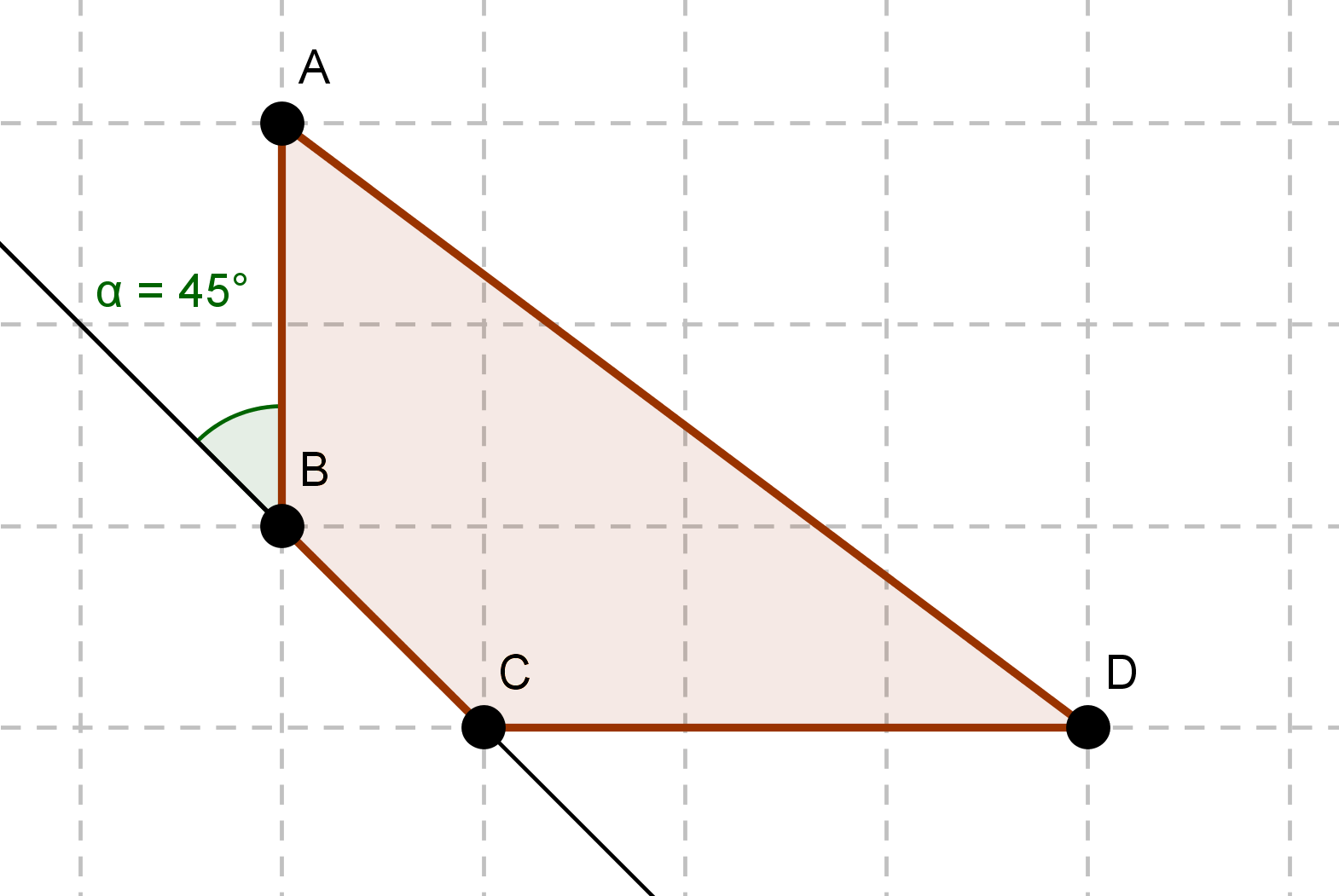#include <stdio.h>
#include <stdio.h>
#include <math.h>
#include <algorithm>
using namespace std;
#define eps 1e-8
struct Pt {
double x, y;
Pt(double a = 0, double b = 0):
x(a), y(b) {}
bool operator<(const Pt &a) const {
if(fabs(x-a.x) > eps) return x < a.x;
return y < a.y;
}
bool operator==(const Pt &a) const {
return fabs(x-a.x) < eps && fabs(y-a.y) < eps;
}
Pt operator+(const Pt &a) const {
return Pt(x + a.x, y + a.y);
}
Pt operator-(const Pt &a) const {
return Pt(x - a.x, y - a.y);
}
Pt operator/(const double val) const {
return Pt(x / val, y / val);
}
Pt operator*(const double val) const {
return Pt(x * val, y * val);
}
};
typedef Pt Vector;
double dist(Pt a, Pt b) {
return hypot(a.x - b.x, a.y - b.y);
}
double dot(Pt a, Pt b) {
return a.x * b.x + a.y * b.y;
}
double cross2(Pt a, Pt b) {
return a.x * b.y - a.y * b.x;
}
double cross(Pt o, Pt a, Pt b) {
return (a.x-o.x)*(b.y-o.y)-(a.y-o.y)*(b.x-o.x);
}
int between(Pt a, Pt b, Pt c) {
return dot(c - a, b - a) >= 0 && dot(c - b, a - b) >= 0;
}
int onSeg(Pt a, Pt b, Pt c) {
return between(a, b, c) && fabs(cross(a, b, c)) < eps;
}
double distProjection(Pt as, Pt at, Pt s) {
double a, b, c;
a = at.y - as.y;
b = as.x - at.x;
c = - (a * as.x + b * as.y);
return fabs(a * s.x + b * s.y + c) / hypot(a, b);
}
struct Seg {
Pt s, e;
};
int calcIntersection(Seg a, Seg b, Pt &p) {
double a1, b1, c1, a2, b2, c2;
double d, dx, dy;
a1 = a.s.y-a.e.y, b1 = -a.s.x+a.e.x;
a2 = b.s.y-b.e.y, b2 = -b.s.x+b.e.x;
c1 = a1*a.s.x + b1*a.s.y;
c2 = a2*b.s.x + b2*b.s.y;
d = a1*b2 - a2*b1;
dx = c1*b2 - c2*b1;
dy = a1*c2 - a2*c1;
if(fabs(d) < eps)
return 0;
p.x = dx / d, p.y = dy / d;
return onSeg(a.s, a.e, p) && onSeg(b.s, b.e, p);
}
int inPolygon(Pt p[], int n, Pt q) {
int i, j, cnt = 0;
for(i = 0, j = n-1; i < n; j = i++) {
if(p[i].y > q.y != p[j].y > q.y &&
q.x < (p[j].x-p[i].x)*(q.y-p[i].y)/(p[j].y-p[i].y) + p[i].x)
cnt++;
}
return cnt&1;
}
double calcArea(Pt p[], int n) {
if(n < 3) return 0.0;
double ret = 0;
int i;
p[n] = p[0];
for(i = 0; i < n; i++)
ret += p[i].x * p[i+1].y - p[i].y * p[i+1].x;
return fabs(ret)/2;
}
int monotone(int n, Pt p[], Pt ch[]) {
sort(p, p+n);
int i, m = 0, t;
for(i = 0; i < n; i++) {
while(m >= 2 && cross(ch[m-2], ch[m-1], p[i]) <= 0)
m--;
ch[m++] = p[i];
}
for(i = n-1, t = m+1; i >= 0; i--) {
while(m >= t && cross(ch[m-2], ch[m-1], p[i]) <= 0)
m--;
ch[m++] = p[i];
}
return m-1;
}
#define INF 1e+30
double calcSquare(double m, Pt p, Pt ch[], int n) {
double a, b, c, lab;
double w = 0, hl = 0, hr = 0, h;
a = sin(m), b = -cos(m), c = - (a * p.x + b * p.y), lab = hypot(a, b);
int pp = 0, qq = 0;
for(int i = 0; i < n; i++) {
double d = fabs(a * ch[i].x + b * ch[i].y + c) / lab;
w = max(w, d);
if(a * ch[i].x + b * ch[i].y + c < - 1e-6)
pp++;
if(a * ch[i].x + b * ch[i].y + c > 1e-6)
qq++;
}
a = cos(m), b = sin(m), c = - (a * p.x + b * p.y), lab = hypot(a, b);
for(int i = 0; i < n; i++) {
double d = fabs(a * ch[i].x + b * ch[i].y + c) / lab;
if(a * ch[i].x + b * ch[i].y + c < 0)
hl = max(hl, d);
else
hr = max(hr, d);
}
h = hl + hr;
return max(w, h) * max(w, h);
}
const double pi = acos(-1);
double ternary_search(double l, double r, Pt p, Pt ch[], int n) {
double mid, midmid, md, mmd;
double ret = INF;
while(fabs(l-r) > eps) {
mid = (l+r)/2;
midmid = (mid+r)/2;
md = calcSquare(mid, p, ch, n);
mmd = calcSquare(midmid, p, ch, n);
ret = min(ret, md);
ret = min(ret, mmd);
if(md < mmd)
r = midmid;
else
l = mid;
}
return ret;
}
double smallSquare(int n, Pt ch[]) {
double ret = INF;
for(int i = 0, j = n-1; i < n; j = i++) {
double l = atan2(ch[j].y - ch[i].y, ch[j].x - ch[i].x);
double r = atan2(ch[(i+1)].y - ch[i].y, ch[(i+1)].x - ch[i].x) - pi;
r = l + fmod(fmod(r - l, 2 * pi) + 2 * pi, 2 * pi);
if(l <= r) {
ret = min(ret, ternary_search(l, r, ch[i], ch, n));
} else {
ret = min(ret, ternary_search(l, pi, ch[i], ch, n));
ret = min(ret, ternary_search(-pi, r, ch[i], ch, n));
}
}
return ret;
}
int main() {
Pt p[2048], ch[2048];
int n, m;
int testcase, cases = 0;
scanf("%d", &testcase);
while(testcase--) {
scanf("%d", &n);
for(int i = 0; i < n; i++)
scanf("%lf %lf", &p[i].x, &p[i].y);
m = monotone(n, p, ch);
if(m == 1) {
printf("%.2lf\n", 0);
continue;
}
double ret = smallSquare(m, ch);
printf("%.2lf\n", ret);
}
return 0;
}
